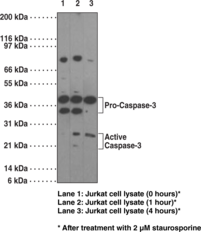Territorial Availability: Available through Bertin Technologies only in France
- Correlated keywords
- caspases caspase 3 cysteine proteases cell death apoptosis antibodies western blots blotting immunoblotting WB immunohistochemistry IHC frozen paraffin-embedded paraffin embedded yama CPP32 apopain codes PARP poly(ADP-ribose) polymerase DNA-PK DNAPK DNA PK actin GAS2 pro-caspase procaspase pro CrmA small large subunits
- Product Overview:
Caspases are a family of cysteine proteases that are key mediators of programmed cell death or apoptosis.{18384} The precursor form of all caspases is composed of a prodomain and large and small catalytic subunits. The active forms of caspases are generated by several stimuli including ligand-receptor interactions, growth factor deprivation, and inhibitors of cellular functions. All known caspases require cleavage adjacent to aspartates to liberate one large and one small subunit, which associate into an a2b2 tetramer to form the active enzyme. The gene for caspase-3, also known as yama, CPP32, and apopain, codes for a 32 kDa protein.{8444,18385,18386} Caspase-3 cleaves the death substrate poly(ADP-ribose) polymerase (PARP) to a specific 85 kDa form observed during apoptosis and is inhibitable by the CrmA protein. Other caspase-3 substrates include DNA-PK, actin, GAS2, procaspase-6, etc.{6292} Caspase-3 is activated by cleavage events at Asp28/Ser29 (between N-terminal pro-domain) and Asp175/Ser176 (between large and small subunits) to generate a large subunit of 17 kDa and a small subunit of 12 kDa.{18385}
Cayman Chemical’s mission is to help make research possible by supplying scientists worldwide with the basic research tools necessary for advancing human and animal health. Our utmost commitment to healthcare researchers is to offer the highest quality products with an affordable pricing policy.
Our scientists are experts in the synthesis, purification, and characterization of biochemicals ranging from small drug-like heterocycles to complex biolipids, fatty acids, and many others. We are also highly skilled in all aspects of assay and antibody development, protein expression, crystallization, and structure determination.
Over the past thirty years, Cayman developed a deep knowledge base in lipid biochemistry, including research involving the arachidonic acid cascade, inositol phosphates, and cannabinoids. This knowledge enabled the production of reagents of exceptional quality for cancer, oxidative injury, epigenetics, neuroscience, inflammation, metabolism, and many additional lines of research.
Our organic and analytical chemists specialize in the rapid development of manufacturing processes and analytical methods to carry out clinical and commercial GMP-API production. Pre-clinical drug discovery efforts are currently underway in the areas of bone restoration and repair, muscular dystrophy, oncology, and inflammation. A separate group of Ph.D.-level scientists are dedicated to offering Hit-to-Lead Discovery and Profiling Services for epigenetic targets. Our knowledgeable chemists can be contracted to perform complete sample analysis for analytes measured by the majority of our assays. We also offer a wide range of analytical services using LC-MS/MS, HPLC, GC, and many other techniques.
Accreditations
ISO/IEC 17025:2005
ISO Guide 34:2009
Cayman is a leader in the field of emerging drugs of abuse, providing high-purity Schedule I-V Controlled Substances to federally-licensed laboratories and qualified academic research institutions for forensic analyses. We are certified by ACLASS Accreditation Services with dual accreditation to ISO/IEC 17025:2005 and ISO Guide 34:2009.





